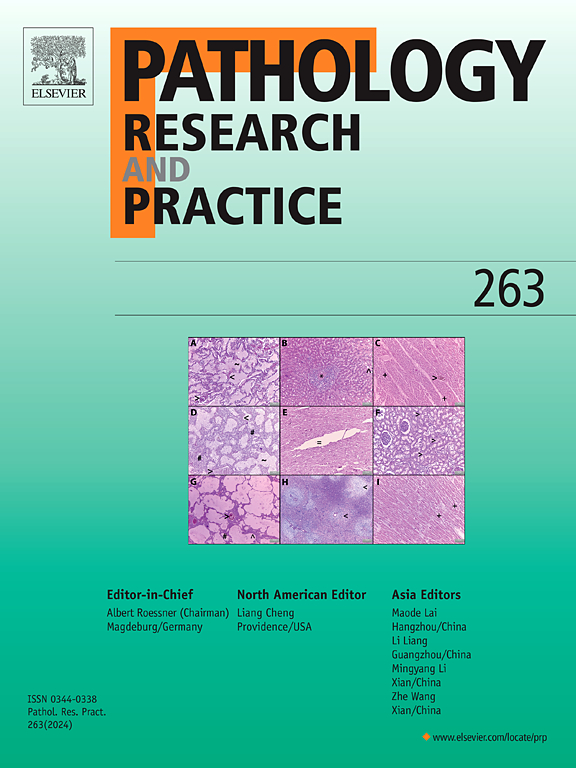METTL3通过ythdf2依赖性的GATA4降解促进卵巢癌进展
IF 3.2
4区 医学
Q2 PATHOLOGY
引用次数: 0
摘要
卵巢癌(OC)仍然是一种高度致命的妇科恶性肿瘤,由于其侵袭性进展和治疗耐药性,治疗选择有限。n6 -甲基腺苷(m6A) RNA修饰已成为肿瘤发生的关键调节因子,但m6A调节因子与OC进展之间的具体机制需要进一步阐明。在这里,我们报道METTL3通过增强ythdf2依赖的肿瘤抑制因子GATA4的降解来促进OC的进展。从机制上讲,mettl3介导的GATA4转录本1837和2432核苷酸的超甲基化促进了ythdf2依赖性mRNA的衰变,从而抑制了GATA4的表达。STM2457对METTL3的药理抑制增加了GATA4的丰度,并减轻了OC的恶性表型。单细胞RNA测序(scRNA-seq)显示,在OC微环境中的颗粒细胞、成纤维细胞和内皮细胞中,GATA4明显下调,这可能与异常的上皮-间质转化(EMT)、异常增殖和基质重塑有关。总之,我们的研究结果建立了一个METTL3-YTHDF2调节轴,该轴可破坏GATA4 mRNA的稳定性,为OC进展的表观遗传控制提供了新的见解。因此,针对这一轴可能提供有希望的治疗策略,以改善OC患者的预后。本文章由计算机程序翻译,如有差异,请以英文原文为准。
METTL3 promotes ovarian cancer progression through YTHDF2-dependent degradation of GATA4
Ovarian cancer (OC) remains a highly lethal gynecological malignancy with limited therapeutic options due to its aggressive progression and therapeutic resistance. N6-methyladenosine (m6A) RNA modification has emerged as a critical regulator of tumorigenesis, but the specific mechanisms linking m6A regulators to OC progression require further clarification. Here, we report that METTL3 promotes OC progression by enhancing YTHDF2-dependent degradation of the tumor suppressor GATA4. Mechanistically, METTL3-mediated hypermethylation of GATA4 transcripts at nucleotides 1837 and 2432 promotes YTHDF2-dependent mRNA decay, thereby suppressing GATA4 expression. Pharmacological inhibition of METTL3 with STM2457 increases GATA4 abundance, and attenuates malignant phenotypes of OC. Single-cell RNA sequencing (scRNA-seq) revealed that GATA4 was markedly downregulated in granulosa cells, fibroblasts, and endothelial cells within the OC microenvironment, potentially linking its loss to aberrant epithelial-mesenchymal transition (EMT), abnormal proliferation, and stromal remodeling. In conclusion, our findings establish a METTL3-YTHDF2 regulatory axis that destabilizes GATA4 mRNA, providing novel insights into the epigenetic control of OC progression. Thus, targeting this axis may offer promising therapeutic strategies to improve outcomes for OC patients.
求助全文
通过发布文献求助,成功后即可免费获取论文全文。
去求助
来源期刊
CiteScore
5.00
自引率
3.60%
发文量
405
审稿时长
24 days
期刊介绍:
Pathology, Research and Practice provides accessible coverage of the most recent developments across the entire field of pathology: Reviews focus on recent progress in pathology, while Comments look at interesting current problems and at hypotheses for future developments in pathology. Original Papers present novel findings on all aspects of general, anatomic and molecular pathology. Rapid Communications inform readers on preliminary findings that may be relevant for further studies and need to be communicated quickly. Teaching Cases look at new aspects or special diagnostic problems of diseases and at case reports relevant for the pathologist''s practice.

 求助内容:
求助内容: 应助结果提醒方式:
应助结果提醒方式:


